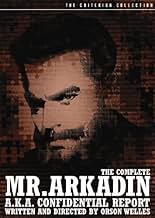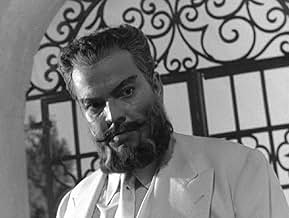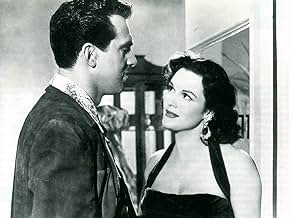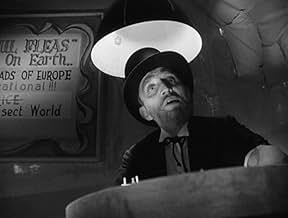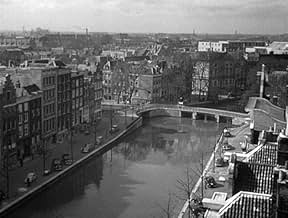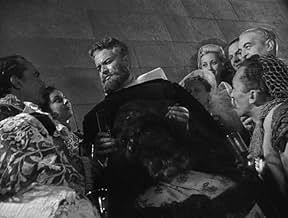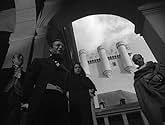Un aventurier américain enquête sur le passé d'un mystérieux magnat, M. Arkadin... ce qui l'expose à de graves dangers.Un aventurier américain enquête sur le passé d'un mystérieux magnat, M. Arkadin... ce qui l'expose à de graves dangers.Un aventurier américain enquête sur le passé d'un mystérieux magnat, M. Arkadin... ce qui l'expose à de graves dangers.
- Réalisation
- Scénario
- Casting principal
- Récompenses
- 1 nomination au total
- Oscar
- (as O'Brady)
- Woman in Apartment
- (as Tamara Shane)
- Secretary
- (as Terence Langdon)
- Parisian Woman with Bread
- (as Annabel)
- First Munich Policeman
- (as Gert Frobe)
- Second Munich Policeman
- (as Eduard Linker)
Avis à la une
For those interested in investigating further, The Criterion Collection have done a wonderful 3 disc edition which collates all the available edits (including two Spanish versions which are known, hilariously, by the unexplained mis-crediting of the lead actor!?) and working them into a 'final' version hinted at by Welles' notes and conversations with the ubiquitous Peter Bogdanovich (who also features in the documentary, unsurprisingly). This 'final' version, while far from perfect, restores the original flashback structure as well as the original beginning and ending sequences. On the first disc, however, is the 'Corinth' version (originally discovered by Bogdanovich) that already incorporates some of the author's original intentions. This particular edit also features a highly illuminating commentary track by Welles scholars Jonathan Rosenbaum and James Naremore who consider this version to be the most satisfying. Also included are three mp3's of the aforementioned Harry Lime radio plays that had a direct influence on the story, featurettes by Welles biographer and actor Simon Callow, and a highly welcome reprint of the Mr. Arkadin novel (or novelisation? - you decide) with an excellent newly commissioned introduction by Robert Polito. All in all, this set is a must for the Welles aficionado and should be of interest to anyone with a true appreciation of cinema.
Mr Arkadin is a thriller about a man so afraid of losing his daughter's love and esteem he is willing to kill to maintain it. The story is pure genius: after an opening shot showing an empty aeroplane in mid-air, we flash back to a man found stabbed in the back. Hence Welles sets up two mysteries at once for us to think about. When the knifed man tells Arden's girlfriend two names that are worth a fortune, Van Stratten thinks to blackmail Mr Arkadin with this scant information. Arkadin calls his bluff, and instead confides in Van Stratten that back in 1927 he found himself in Prague wearing a suit with a lot of money in his pocket and no recollection of who he was or how he got there - total amnesia. He hires Van Stratten to find out who Mr Arkadin really is, and thus Van Stratten embarks on a voyage around Europe, trying to trace Arkadin's life back from 1927.
At each destination in Europe, Van Stratten finds Arkadin there too, so we learn that Arkadin has more on the mind than tracing his origins. And when the people Van Stratten interviews start dying, the suspense is shifted up another gear.
Were it not for the lame performance by Arden and the odd moment of awful dubbing, this flawed masterpiece may well have been held in as high esteem as Kane, Ambersons, Touch Of Evil and The Lady From Shanghai, rather than being relegated to Macbeth's 'interesting failure' status. Storytelling wise, this is Welles' at his best, and it's surreal, disturbing plot is more a meeting of The Lady From Shaghai and The Trial than Citizen Kane. Personally, I think this is a greater picture than Touch Of Evil's plain power-corrupts line and The Lady From Shaghai which depends on one high-concept set-piece after another.
The fact that Arkadin connects closely to Kane or Quinlan is obvious and certainly interesting. Although it should seem obvious at this late date that Welles has patterns and themes that reoccur throughout his films. Does this fact still illuminate anything? If anybody questions the fact that Welles is an artist...well, this film will just add to their confusion. But for us believers this film can function like the ritual suffering of the penitents in the film. It hurts so good!
And somehow it works - but only just.
If you haven't watched this film yet and are contemplating doing so I will warn you that Robert Arden's 100% subtlety free performance is incredibly bad and his character (Guy Van Stratten) has to carry the first part of the movie almost alone. Please just grit your teeth and put up with him (and the dodgy lip sync) for a bit, because what comes later is weird, deeply flawed, but bizarrely watchable semi-masterpiece. Dreamlike and occasionally very funny.
I would love to have seen Welles' version.
The music is perfect.
This movie is a mess, but it's a fascinating mess. The movie was taken out of Welles' hands in the editing phase and was released in various cuts all over the world over the course of a decade or more. The version I watched was assembled from all of the various versions, and supposedly most closely resembles what Welles wanted. It's still a slightly confusing jumble, but it's entertaining. It's unlike most movies of the mid 50's, with rapid edits, odd camera angles, and the aforementioned narrative structure utilizing flashbacks.
The sound is either mostly or all post-dub, which also adds to the disorienting effect. This movie has a lot of flaws (several shots are out of focus, Welles' fake nose looks terrible), but I found it an intriguing mystery, and I was never quite certain what was coming, which is exceedingly rare these days. Plus, the many brief appearances of classic character actors, such as AkimTamiroff, Katina Paxinou, Mischa Auer, and Michael Redgrave, all playing bizarre and eccentric characters, is amusing.
Le saviez-vous
- AnecdotesUntil recently, the version in possession of Corinth Films was generally regarded closest to Orson Welles' cut. In April of 2006, the Criterion Collection released a comprehensive three-DVD set of this movie, featuring three versions: the "Corinth" version, "Confidential Report" (the European cut), and the newly edited "Comprehensive" version. Each version contains a few shots or lines that are missing from the other two. Because this movie was taken out of Welles' control in post-production, it will never be known exactly what he had in mind for the complex flashback structure of which he spoke later in his life. "The Comprehensive Version", which airs on Turner Classic Movies, runs one hour 47 minutes.
- GaffesOrson Welles' prosthetic nose disappears when Arkadin meets with Jakob Zouk.
- Citations
Gregory Arkadin: And now I'm going to tell you about a scorpion. This scorpion wanted to cross a river, so he asked the frog to carry him. No, said the frog, no thank you. If I let you on my back you may sting me and the sting of the scorpion is death. Now, where, asked the scorpion, is the logic in that? For scorpions always try to be logical. If I sting you, you will die. I will drown. So, the frog was convinced and allowed the scorpion on his back. But, just in the middle of the river, he felt a terrible pain and realized that, after all, the scorpion had stung him. Logic! Cried the dying frog as he started under, bearing the scorpion down with him. There is no logic in this! I know, said the scorpion, but I can't help it - it's my character. Let's drink to character.
- ConnexionsEdited into Histoire(s) du cinéma: Fatale beauté (1994)
- Bandes originalesSaeta
Performed by Antoñita Moreno.
Meilleurs choix
- How long is Confidential Report?Alimenté par Alexa
Détails
Box-office
- Montant brut mondial
- 4 528 $US
- Durée
- 1h 33min(93 min)
- Couleur
- Rapport de forme
- 1.37 : 1

